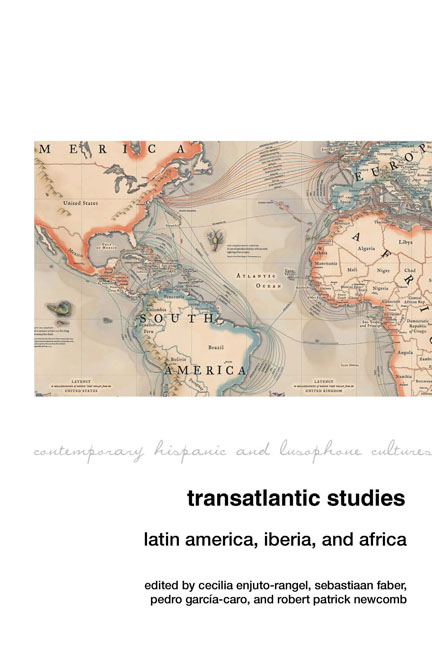Book contents
- Frontmatter
- Contents
- Introduction: Transatlantic Studies: Staking Out the Field
- Transatlantic Methodologies
- Transatlantic Linguistic Debates
- Transatlantic Displacement
- Transatlantic Memory
- Transatlantic Postcolonial Affinities
- Transatlantic Influence
- Epilogue: The Futureâif There Is OneâIs Transatlantic
- Index
6 - Transatlantic Currents: Oceanic Crossings in Novás Calvo's El negrero
- Frontmatter
- Contents
- Introduction: Transatlantic Studies: Staking Out the Field
- Transatlantic Methodologies
- Transatlantic Linguistic Debates
- Transatlantic Displacement
- Transatlantic Memory
- Transatlantic Postcolonial Affinities
- Transatlantic Influence
- Epilogue: The Futureâif There Is OneâIs Transatlantic
- Index
Summary
Transatlantic reading in the Iberian disciplines presumes that the Atlantic Ocean is more than an empty space connecting Hispanophone colonies or republics in the Americas to a metropolis in Iberia; it shares a circum-Atlantic perspective that considers movements “around, across, and through the Atlantic world system” (Baucom 2005: 314). In the twentieth century, author Lino Novás Calvo addressed such transatlantic questions and questioned the discourses of nineteenth-century values of mobility and human ingenuity that had characterized depictions of the Atlantic in earlier periods. In these pages I propose an analysis of Novás Calvo's novel Pedro Blanco, el negrero (1933) that forefronts the place of the Atlantic in its plot and characterization.
Novás Calvo not only defined the transatlantic in his personal biography, but also wrote about the Atlantic in his debut novel, Pedro Blanco, el negrero. Elizabeth DeLoughrey, the noted scholar of maritime studies, has described the European conceptualization of the Atlantic as an aqua nullius and “colonial narratives of maritime expansion [that …] depicted the ocean as blank space to be traversed” (2010: 703). Novás Calvo questions this Western legacy. By reifying the Atlantic as an indomitable natural space, the novel undermines the protagonist's transatlantic crossings as human triumphs. DeLoughrey further advocates an approach to the seas that considers how the oceans form humans rather than how the Atlantic was formed by human history (2010: 707). The novel considered in this essay opens up the transatlantic in the Hispanic tradition to precisely this question and thus moves beyond a neo-imperial framework, even though imperial practices are central to its plot.
Why a national culture claims a given writer as its own is an issue beyond the scope of this essay. Nevertheless, a few observations on biography are in order here as the author under consideration is claimed by multiple traditions. According to Enrique Anderson-Imbert, Lino Novás Calvo was “un desarraigado, un dislocado” (1975: 214). Whether or not he was truly rootless, he was indeed peripatetic. Born in 1903 in a village outside of La Coruña, he emigrated to Cuba after the end of the First World War (Roses 2003: 358). In Havana, this Galician speaker acquired Spanish and began to work as a journalist in his new language.
- Type
- Chapter
- Information
- Transatlantic StudiesLatin America, Iberia, and Africa, pp. 76 - 84Publisher: Liverpool University PressPrint publication year: 2019



